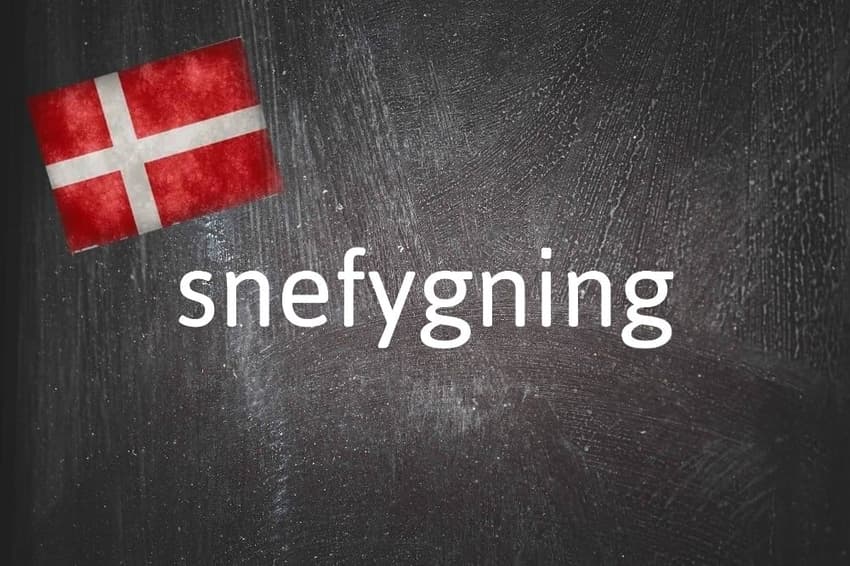Danish word of the day: Snefygning

Photo by Francesco Ungaro on Unsplash and Nicolas Raymond/FlickR
If you’re out in Denmark this week, there’s a good chance you could meet with today’s word of the day, ‘snefygning’.
What is snefygning?
Sne is snow, and there’s no shortage of that in Denmark at the time of writing with late November temperatures plunging past minus 10 and many parts of the country getting several centimetres of the white stuff.
Fygning (the first ‘g’ is silent) comes from the verb at fyge. This word doesn’t have an English or even Latin equivalent, and is related to the Old Norse word fjúka – originally an onomatopoeic word about the sound of the wind.
You can say that something fyger if it is blown up by a strong gust of wind in quick and uneven bursts. This can apply to ash, to the wind itself, or even figuratively to words (bandeordene fyger hen over baren, og ingen har lyst til at lytte til hans vrede gloser: “the swear words come like a whirlwind across the bar, and nobody wants to listen to his angry vocabulary”).
Why do I need to know snefygning?
As well as the examples given above, at fyge can also (and is probably most commonly) associated with snow to make the noun snefygning, meaning when the wind kicks up and fresh snow is blown into the air, dancing momentarily in the winter cold before falling back to the ground.
You might hear a weather forecaster warn against snefygninger, hvis det begynder at blæse (“snow being blown up if the wind increases”).
There are a number of similar-sounding but distinct words about snow in Danish: snefnug (snowflake), snefog, snedynge and snedrive (all snow drift) and snefri (which can mean “free of snow”, but also when kids are given the day off school due to the snow).
Snefygning is probably the most niche and looks like it could be aired more than usual this winter.
Comments
See Also
What is snefygning?
Sne is snow, and there’s no shortage of that in Denmark at the time of writing with late November temperatures plunging past minus 10 and many parts of the country getting several centimetres of the white stuff.
Fygning (the first ‘g’ is silent) comes from the verb at fyge. This word doesn’t have an English or even Latin equivalent, and is related to the Old Norse word fjúka – originally an onomatopoeic word about the sound of the wind.
You can say that something fyger if it is blown up by a strong gust of wind in quick and uneven bursts. This can apply to ash, to the wind itself, or even figuratively to words (bandeordene fyger hen over baren, og ingen har lyst til at lytte til hans vrede gloser: “the swear words come like a whirlwind across the bar, and nobody wants to listen to his angry vocabulary”).
Why do I need to know snefygning?
As well as the examples given above, at fyge can also (and is probably most commonly) associated with snow to make the noun snefygning, meaning when the wind kicks up and fresh snow is blown into the air, dancing momentarily in the winter cold before falling back to the ground.
You might hear a weather forecaster warn against snefygninger, hvis det begynder at blæse (“snow being blown up if the wind increases”).
There are a number of similar-sounding but distinct words about snow in Danish: snefnug (snowflake), snefog, snedynge and snedrive (all snow drift) and snefri (which can mean “free of snow”, but also when kids are given the day off school due to the snow).
Snefygning is probably the most niche and looks like it could be aired more than usual this winter.
Join the conversation in our comments section below. Share your own views and experience and if you have a question or suggestion for our journalists then email us at [email protected].
Please keep comments civil, constructive and on topic – and make sure to read our terms of use before getting involved.
Please log in here to leave a comment.